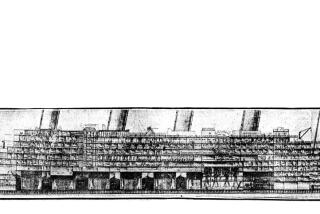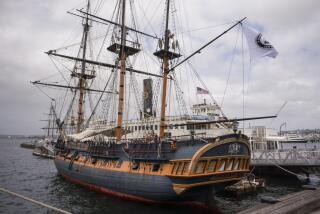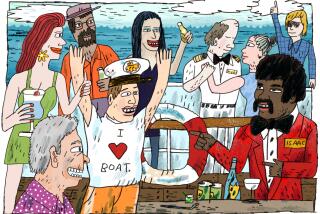Voyage into linguistic genderism on the high seas could really be just the tip of the iceberg
- Share via
Areader points out that my column on the Titanic, in which I referred to her “maiden voyage,” “her top speed” and “her furnaces,” appeared in The Times on the same day as a story about a “Guide to Nonsexist Language” which deplores such feminine usages.
According to the story, the Project on the Status of Education of Women, which is run by the Assn. of American Colleges, has published the four-page guide of examples of sexist language and its recommended alternatives for writers.
“Breaking away from sexist language and traditional patterns can refresh your style,” it says, in the hope, evidently, of seducing writers away from such sexist words as waitress , for which it recommends either waiter or waitperson , and sportsmanship , for which it recommends fair play . It also says, “Nations, battleships . . . and other objects have no gender.”
I have frequently noted the absurdity of such “inclusive” words as waitperson , chairperson and freshperson , and except for chairperson , which is now common, they seem to be losing out, though we did see waitperson on a menu on our recent trip.
If other writers think they can freshen their style by writing his/her or her or his , or handmade in place of man ufactured (imagine a handmade automobile), they are welcome to it.
But I would like to say a word (if only farewell) for that time-honored expression maiden voyage.
Maiden certainly is a feminine adjective, and its use implies that a ship is also feminine.
Both these notions are of ancient vintage.
I cannot see how women’s expectations can be limited by thinking of a ship as she and of her first voyage as a maiden voyage.
Of course, the alternatives are simple. A ship can be an it and its maiden voyage can be called its first voyage. Nothing absurd in that and no loss in meaning.
But it will certainly require many revisions in the literature of the sea.
Sailors have thought of their ships as females for centuries. I don’t know why that is. Perhaps, in the beginning, they thought of the ship as their mother, their source of life, comfort and security.
Or they thought of their ship, perhaps, as their lover, with whom they shared the adventure and booty of the seas, and in whose arms they found solace. Night after night, she rocked them to sleep. She was their shelter, their identity, their hearth and their home. They worked for her, they fought for her, they sometimes died for her.
The English poet laureate John Masefield had no doubt about the sex of a ship when he wrote:
I must down to the seas again, to the lonely sea
and the sky, And all I ask is a tall ship and a star to steer
her by . . . .
Richard Henry Dana, author of “Two Years Before the Mast,” used the subjective and objective pronouns in his touching elegy to his own ship, written 22 years after “Two Years Before the Mast”: “Like a true ship, committed to her element once for all at her launching, she perished at sea.”
Adm. Chester William Nimitz, hero of the war in the Pacific, was perhaps more sexist than modern decorum would permit when he said, “A ship is always referred to as ‘she’ because it costs so much to keep one in paint and powder.”
Felix Reisenberg, the great writer of the sea, invented a truly sexist explanation for the femininity of ships, blaming it on the maleness of the sea.
“The sea has always been a seducer, a careless lying fellow, not feminine, as many writers imagine, but strongly masculine in its allurement. The king of the sea, with his whiskers of weed and his trident and dolphins, truly represents the main and gives it character. The sea, like a great sultan, supports thousands of ships, his lawful wives. These he caresses and chastises as the case may be. This explains the feminine gender of all proper vessels.”
I am one of those writers who imagine that the sea is feminine, and I despise the image of a great sultan caressing and chastising his wives at will.
Are we not born of the sea? Do we not sail on her bosom? Does she not toss us about and bring us home?
At least Reisenberg validates the sex of ships, although I think his reasoning is flawed.
As for maiden voyage , the Oxford English Dictionary defines maiden , the adjective, as meaning “the first of its kind,” as in maiden speech , “the first speech delivered in the House by a member of Parliament,” and traces its use in this sense to 1555.
Maiden is cited from the London Times in 1884: “The new steamship sailed from Plymouth on her maiden trip to the Antipodes”; and from the Statesman in 1901: “The steamer was on her maiden voyage from London to China.”
In her letter pointing out my transgression in calling the Titanic’s first trip her “maiden voyage,” Edie Landau observes: “I was very relieved to find that you did drop the Titanic’s gender by referring to ‘its passengers.’ ”
Excuse me. A mere lapse.
We must not forget that the Titanic sailed on her maiden voyage from Southampton on April 10, 1912, when sexist language was in flower.
The Titanic was a maiden, and her first voyage was her maiden voyage.
I can do no more for her memory than to honor the language of her time.
More to Read
Sign up for our Book Club newsletter
Get the latest news, events and more from the Los Angeles Times Book Club, and help us get L.A. reading and talking.
You may occasionally receive promotional content from the Los Angeles Times.









